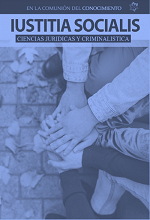Principle of speed in judicial proceedings during the covid-19 pandemic in Riobamba
DOI:
https://doi.org/10.35381/racji.v5i3.1085Keywords:
Right to justice, administration of justice, law enforcement.Abstract
The main objective of the research is to analyze the principle of speed in judicial processes during a COVID-19 pandemic in the city of Riobamba, located in the Riobamba Canton of the Chimborazo Province - Ecuador. It was generated primarily from the analytical - synthetic method, working on evidence and documented testimonies on the principle of speed in judicial processes during the COVID-19 pandemic in the city of Riobamba. It has been determined that during the months of confinement there has been an increase in the rates of complaints and crimes, among the most common we have violence against women. The principle of speed has played an important role and has been effectively applied within judicial processes in the city of Riobamba, due to the fact that positive results have been achieved in favor of justice.
Downloads
References
Ávila-Barrios, D. (2014). El uso de las TICs en el entorno de la nueva gestión pública mexicana. [The use of ITC's in the Vicinity of New Public Management Mexican]. Andamios, 11(24), 263-288.
Canelo-Rabanal, R. V. (2006). La celeridad procesal, nuevos desafíos. Hacia una reforma integral del proceso civil en busca de la justicia pronta. [The procedural speed, new challenges. Towards a comprehensive reform of the civil process in search of prompt justice]. Revista Iberoamericana de Derecho Procesal Garantista. Recuperado de https://n9.cl/5ew3a
Carbonell, M. (2020). Justicia y pandemia. [Justice and pandemic]. [Internet]. Recuperado de https://n9.cl/jxh7c
Consejo de la Judicatura (2020). Prestación del servicio de justicia en Ibarra se cumple bajo estrictas medidas de bioseguridad. [Provision of the justice service in Ibarra is carried out under strict biosecurity measures]. Recuperado de https://n9.cl/a13os
Corte Interamericana de Derechos Humanos (2020). COVID-19 y derechos humanos: los problemas y desafíos deben ser abordados con perspectiva de derechos humanos y respetando las obligaciones internacionales. [COVID-19 and human rights: problems and challenges must be approached with a human rights perspective and respecting international obligations]. Recuperado de https://n9.cl/2x2h
Espeche. S. (2020). Justicia y tecnología en el contexto de la pandemia del COVID-19. [Justice and technology in the context of the COVID-19 pandemic]. [Internet]. Recuperado de https://n9.cl/4rjs
Garat, M. P., Risso Ferrand, M., Ruocco, G., Ramos Cabanellas, B., Valentín, G., Slinger, L., Costa, L., Herdt, C., Gamarra, D., & Guerra, W. (2020). El Derecho frente a la pandemia por COVID-19. [The Law in the face of the COVID-19 pandemic]. Revista De Derecho, (21), 01-24. https://doi.org/10.22235/rd.vi21.2193
García-Barrera, M. (2018). Juzgado sin papel, un paso más de la justicia electrónica [Paperless Courts, One More Step of Electronic Justice]. Revista IUS, 12(41), 133-154.
García-Mejía, M. (2020). Justicia y COVID-19: 3 formas de impartir justicia durante una pandemia. [Justice and COVID-19: 3 Ways to Deliver Justice During a Pandemic]. [[Internet]. Recuperado de https://n9.cl/f06z
Jarama-Castillo, Z, Vásquez-Chávez, J, & Durán-Ocampo, A. (2019). El principio de celeridad en el código orgánico general de procesos, consecuencias en la audiencia. [The principle of speed in the general organic code of processes, consequences for the audience]. Revista Universidad y Sociedad, 11(1), 314-323.
Lopera-Echavarría, J, & Ramírez-Gómez, C, & Zuluaga-Aristazábal, M, & Ortiz-Vanegas, J. (2010). El método analítico como método natural. Nómadas. Critical Journal of Social and Juridical Sciences, 25(1).
Montero-Medina, D., Bolívar-Guayacundo, M., Aguirre-Encalada, L., & Moreno-Estupiñán, A. (2020). Violencia intrafamiliar en el marco de la emergencia sanitaria por el COVID-19. [Domestic violence in the framework of the health emergency caused by COVID-19]. CienciAméRica, 9(2), 261-267.
Muniz, M. (2020). Justicia durante la cuarentena: tecnología es aliada del trámite judicial. [Justice during quarantine: technology is an ally of the judicial process]. [Internet]. Recuperado de https://n9.cl/jxh7c
Puente. D. (2020). Judicatura busca acelerar trámites de libertad para presos durante la emergencia sanitaria. [Judiciary seeks to speed up procedures for the release of prisoners during the health emergency]. Recuperado de https://n9.cl/n1w0
Ramos, R. (2017). Derecho constitucional en ecuador y aspectos sobre la corrupción desde lo penal. [Constitutional law in ecuador and semblances on the corruption from penal´s view]. Revista Chakiñan de Ciencias Sociales y Humanidades, (2), 35-46.
Robledo. J. (2020). En estos momentos, la Justicia no está preparada para adaptarse a las nuevas tecnologías. [At this time, Justice is not prepared to adapt to new technologies]. [Internet]. Recuperado de https://n9.cl/f1zd8
Published
How to Cite
Issue
Section
License
CC BY-NC-SA : Esta licencia permite a los reutilizadores distribuir, remezclar, adaptar y construir sobre el material en cualquier medio o formato solo con fines no comerciales, y solo siempre y cuando se dé la atribución al creador. Si remezcla, adapta o construye sobre el material, debe licenciar el material modificado bajo términos idénticos.
OAI-PMH URL: https://fundacionkoinonia.com.ve/ojs/index.php/Iustitia_Socialis/oai










